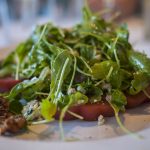This article is copyrighted by GreenMedInfo LLC, 2019
Visit our Re-post guidelines
Visit our Re-post guidelines

If you're struggling with heartburn, constipation or other uncomfortable symptoms of gastroesophageal reflux disease (GERD), adding fiber to your diet, in the form of psyllium seed, may help
Gastroesophageal reflux disease (GERD) is an incredibly common digestive disorder characterized by heartburn and acid reflux -- the phenomenon when stomach acid flows back into your esophagus. Some evidence suggests 40% of Americans may struggle with GERD, while 40% experience heartburn once a month and up to 10% have heartburn every day.[1]
GERD can be severe, leading to lasting complications like teeth erosion andrespiratory problems. Problems with swallowing and chest and abdominal pain may also occur, and even in mild cases resulting bad breath can be a problem.
While it's possible to have GERD without heartburn, this burning sensation in your chest is one of the most common symptoms of GERD -- one that can range from mildly annoying to severely painful. Fortunately, natural treatments exist to treat GERD, and one -- psyllium seed -- works even better than commonly used medications.
Psyllium Seed Treats GERD Better Than Drugs
The drug omeprazole (brand name Prilosec OTC), a proton pump inhibitor (PPI), is often used to treat heartburn and other GERD symptoms, as it helps to reduce acid in your stomach.
However, excess stomach acid is not the cause of GERD, and PPIs are associated with serious side effects, including infection, overgrowth of bacteria in the small intestine, malnutrition and bone problems.[2] Further, one-third of people do not respond to PPI treatment and even among those that do, recurrence is common.
Researchers from Mashhad University of Medical Sciences in Iran compared the effects of psyllium seed on GERD with those of omeprazole, in patients with constipation. Chronic constipation is often seen alongside GERD, and suffering from both conditions may increase GERD symptoms and inhibit response to drug treatments.
"Therefore, it is expected that treatment of constipation can lead to treatment of refractory GERD," the researchers noted, which is why they focused on psyllium seed, a natural fiber known for its laxative effects. For the study 132 people received either omeprazole or psyllium seed twice a day for two months.
Both treatments led to similar improvements; 89.2% of those in the psyllium seed group improved compared to 94% of those in the omeprazole group. However, the difference in recurrence among the groups was striking -- while only 24.1% of those taking psyllium seed had a recurrence of GERD symptoms, 69.8% of those in the omeprazole group had their symptoms return.
As such, psyllium seed was the clear winner, with researchers noting, "The results showed that treatment of functional constipation by Psyllium seed in patients with GERD leads to improvement of GERD and its recurrences in comparison with omeprazole."[3]
Fiber-Rich Diet Improves GERD Symptoms
A similar study looked into the use of psyllium seed to increase dietary fiber intake in people with GERD. Thirty-six people with GERD and low dietary fiber intake (defined as less than 20 grams of fiber a day for the study's purposes) had their diets supplemented with psyllium (5 grams, three times a day) for 10 days.[4]
Significant improvements resulted in heartburn frequency and GERD episodes by the end of the study. While 93.3% of participants suffered from heartburn at the start of the study, this declined to 40% at the end of the study period.
Lower esophageal sphincter resting pressure, a hallmark of GERD, also increased after the fiber-rich diet. According to the researchers, the study is among the first to show that increasing dietary fiber via psyllium may be useful for this facet of GERD, noting:
"The ability of dietary fibers to bind nitric oxide contained in food may diminish its negative effect on lower esophageal sphincter pressure.Our study is the first prospective trial demonstrating that increasing dietary fiber intake results in an increase of minimal esophageal resting pressure, a decrease in the number of gastroesophageal refluxes, and a decrease in heartburn episodes per week in patients with non-erosive GERD."[5]
Psyllium as a Medicinal Plant
Psyllium seed has been used in traditional Persian medicine since ancient times. The mucilage, or gluey substance, produced by the seeds leads to an increase in the wave-like movements, or peristalsis, of the bowel, while also increasing moisture of the stool, helping to increase both the frequency and volume of bowel movements.[6]
Beyond this, psyllium may favorably alter the microbiota in your intestines, as some microbes may use oligosaccharides from psyllium as an energy source. This means psyllium may have prebiotic potential, helping to support the growth of beneficial bacteria in your gut, while also boosting production of short-chain fatty acids that improve the health of your colon.[7]
So while traditionally psyllium has been viewed as an excellent tool for improving constipation, it's now known that it may benefit a number of health conditions, including:[8]
- Irritable bowel syndrome (IBS)
- Colon cancer
- Diabetes
- Cholesterol imbalance
- Obesity
On GreenMedInfo's database page on psyllium, you can find 24 diseases that have been researched in relation to psyllium seed, along with its 18 potential pharmacological actions, which include antispasmodic, anti-inflammatory, immunomodulatory and carminative (flatulence relieving) actions, among others.
Psyllium seed is easy to find at health food stores and can be safely used as a dietary supplement by most people. Be sure to consume it along with plenty of pure water, which makes it easier to swallow.
If you're struggling with GERD symptoms, adding psyllium seed to your daily diet is a simple step to potentially relieve heartburn, constipation and related symptoms -- but it's far from the only natural tool available. At least 30 other natural substances may also help to calm this common condition.
References
[8] Journal of Medical Hypotheses and Ideas December 2015, Volume 9, Issue 2, Supplement, Pages S4-S7

 (NaturalHealth365
(NaturalHealth365








